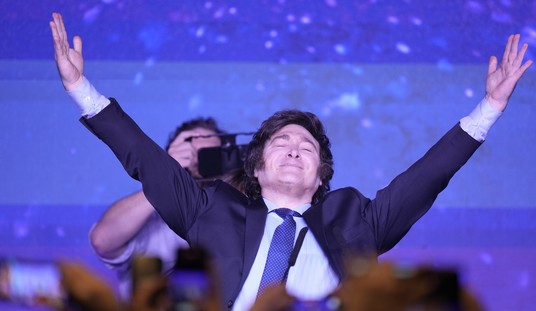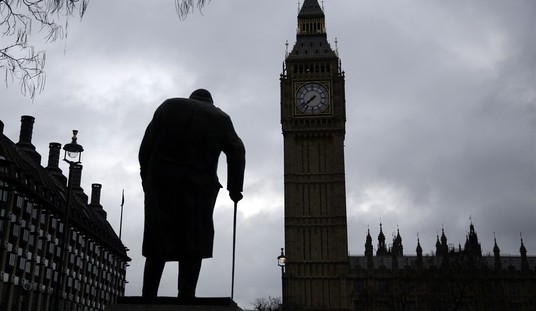Allahpundit links to the above surreal video of the funeral motorcade for Kim Jong Il and asks, “One thing I wonder about Orwellian spectacles like this: Who’s the intended audience?”
The people crying might believe that the outside world is impressed by their tears, but does the leadership, which has a better sense of international opinion, understand how creepy and contemptible this looks to its enemies? It’s the most pitiful, cultish case of Stockholm syndrome on this scale that we’ll ever see (I hope). Or is the spectacle not aimed at foreign audiences at all but exclusively at the inmates of the North Korean gulag? These lines from Michael Totten stick with me: “Especially in full-bore Stalinist systems like North Korea’s, would-be dissidents feel like they’re completely alone, that no one else has any idea the emperor is naked. That’s why these regimes will mobilize massive state resources just to locate and punish a single graffiti artist. It’s critically important that everyone who hates the government feels like they’re the only people who do so.” If you’re a dissent-minded North Korean watching this clip, that’s precisely how you’d feel.
The day after Kim Jong Il’s death was announced, John Derbyshire wrote at the Corner, in a post that was the source of the first half of our headline above, “More often than not, those North Korean tears are real:”
There were similar displays in China when Mao Tse-tung died. In conversations over the years I’ve asked many Chinese friends & relatives who were adults at the time whether they wept, and if so whether sincerely. The answers fall into three groups.
Those three groups, according to Derbyshire, are “Sincere weepers,” “Swept-alongers,” and “The Awkward Squad.” Regarding that last group, Derbyshire writes:
A few have told me: “I pretended to cry, because I might have got in trouble for not crying, but it was fake: in my heart I hated the s.o.b. and was glad he’d died at last.” Those few all had a certain distinct type of personality: skeptical, contrarian, prickly, stubborn, and antisocial — the Awkward Squad. The first job for anyone serious about being a totalitarian dictator is to identify these people and hustle them off to the camps. They are only a small minority: the rest can easily be manipulated. There were similar displays of collective grief when Stalin died. The movie The Inner Circle gets a good scene out of it.
Speaking of movies, if you ever get chance to view it via DVD, Netflix or one of the cable movie channels, don’t miss Sophie Scholl: The Final Days, the 2005 dramatization of Scholl, her brother, and colleague Christoph Probst. The three were guillotined by the Nazis on February 22nd of 1943 for having dropped anti-government leaflets out of the third floor onto the atrium of a building on the campus of Munich University less than a week earlier, in the wake of the Nazis’ monumental losses at Stalingrad.
Such a swift and merciless crackdown on dissent is yet another example, as Michael Totten said in the passage quoted by Allahpundit on the previous page, why a left-wing totalitarian government finds it “critically important that everyone who hates the government feels like they’re the only people who do so.” Otherwise, what Glenn Reynolds dubbed a “preference cascade” in 2002 risks kicking in and overwhelming the regime:
Such regimes have little legitimacy, but they spend a lot of effort making sure that citizens don’t realize the extent to which their fellow-citizens dislike the regime. If the secret police and the censors are doing their job, 99% of the populace can hate the regime and be ready to revolt against it — but no revolt will occur because no one realizes that everyone else feels the same way.
This works until something breaks the spell, and the discontented realize that their feelings are widely shared, at which point the collapse of the regime may seem very sudden to outside observers — or even to the citizens themselves. Claims after the fact that many people who seemed like loyal apparatchiks really loathed the regime are often self-serving, of course. But they’re also often true: Even if one loathes the regime, few people have the force of will to stage one-man revolutions, and when preferences are sufficiently falsified, each dissident may feel that he or she is the only one, or at least part of a minority too small to make any difference.
One interesting question is whether a lot of the hardline Arab states are like this. Places like Iraq, Syria, or Saudi Arabia spend a lot of time telling their citizens that everyone feels a particular way, and punishing those who dare to differ, which has the effect of encouraging people to falsify their preferences. But who knows? Given the right trigger, those brittle authoritarian regimes might collapse overnight, with most of the population swearing — with all apparent sincerity — that it had never supported them, or their anti-Western policies, at all.
Perhaps we should think about how to make it so.
Of course, it also helps to think about what happens afterwards, otherwise we wind up with what we’ve seen throughout the Middle East with Iraq, Afghanistan and the so-called Arab Spring. But in a way, we can’t: in 1945, we had the societal confidence to reshape postwar Germany and Japan in our image, a confidence we’ve lost as our own left made their long march through our own institutions beginning in the 1960s.









Join the conversation as a VIP Member